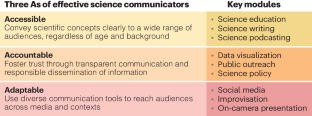Effective science communication is necessary for engaging the public in scientific discourse and ensuring equitable access to knowledge. Training doctoral students in science communication will instill principles of accessibility, accountability, and adaptability in the next generation of scientific leaders, who are poised to expand science’s reach, generate public support for research funding, and counter misinformation. To this aim, we provide a guide for implementing formal science communication training for doctoral students.
This is a preview of subscription content, access via your institution
Access options
Access Nature and 54 other Nature Portfolio journals
Get Nature+, our best-value online-access subscription
$29.99 / 30 days
cancel any time
Subscribe to this journal
Receive 12 print issues and online access
$209.00 per year
only $17.42 per issue
Buy this article
- Purchase on Springer Link
- Instant access to full article PDF
Prices may be subject to local taxes which are calculated during checkout

References
Steinbeck, J. The Log From the Sea of Cortez (Penguin, 2001).
United Nations Educational, Scientific and Cultural Organization. UNESCO Science Report 2021: the Race Against Time for Smarter Development (United Nations, 2021).
Croxson, P. L., Neeley, L. & Schiller, D. Nat. Hum. Behav. 5, 1466–1468 (2021).
Rein, B. Cell 185, 3059–3065 (2022).
Weingart, P. & Guenther, L. J. Sci. Commun. 15, C01 (2016).
Fischhoff, B. & Scheufele, D. A. Proc. Natl Acad. Sci. USA 110, 14031–14032 (2013). (Suppl. 3).
Grorud-Colvert, K., Lester, S. E., Airamé, S., Neeley, E. & Gaines, S. D. Proc. Natl Acad. Sci. USA 107, 18306–18311 (2010).
National Academies of Sciences, Engineering, and Medicine. Ending Discrimination Against People with Mental and Substance Use Disorders: the Evidence for Stigma Change (National Academies Press, 2016).
Neeley, L. et al. Front. Commun. 5, 35 (2020).
Goldstein, C. M., Murray, E. J., Beard, J., Schnoes, A. M. & Wang, M. L. Ann. Behav. Med. 54, 985–990 (2020).
Gascoigne, T. et al. (eds.) Communicating Science: A Global Perspective (ANU Press, 2020).
Rein, B. Neuroscience 530, 192–200 (2023).
Acknowledgements
The authors thank P. Croxson for her involvement as co-founder of the effective science communication course. We also thank the various teaching assistants over the years, who were actively involved in shaping the course: T. Fehr, C. Lardner, C. Guevara and M. O’Brien.
Author information
Authors and Affiliations
Corresponding author
Ethics declarations
Competing interests
The authors declare no competing interests.
Rights and permissions
About this article
Cite this article
Maher, C., Gyles, T., Nestler, E.J. et al. A guide to science communication training for doctoral students. Nat Neurosci (2024). https://doi.org/10.1038/s41593-024-01646-y
Published:
DOI: https://doi.org/10.1038/s41593-024-01646-y
